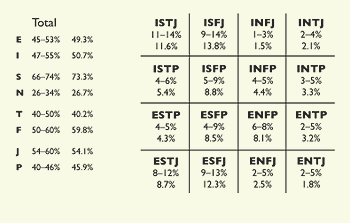If I had to describe how the world makes me feel, I would say trapped. Have you ever felt completely and totally trapped by the confinement and limitations of your tiny brain? I have. Almost every day.
Why can't I mindlessly enjoy a TV show, a movie, or a book? If something doesn't stimulate me intellectually, I find myself quickly skipping onto the next task in hopes of finding something that will. Why do I constantly find myself questioning my existence? Why am I prone to existential crises? Why do I ask "Why?" so often?
Early this past summer, in the midst of one of my many crises, I sought to figure myself out. That is, I sought to find out why I am the way I am, why I think the way I think, and why I act the way I act. After some research on the ever-nifty World Wide Web, I stumbled across something: the Myers-Briggs Type Indicator® (MBTI®) personality inventory. Like anyone else that has ever taken an intro to psychology class, I immediately remembered learning about cognitive functions and the various "tests" in circulation that exist solely to help people discover and learn more about themselves and their personalities. Feeling silly for not remembering the MBTI® personality inventory, I rushed to find an online assessment. Because there are obvious flaws in self-assessments, ranging from skewing your answers to fit an idealized version of yourself, to using prior knowledge of cognitive functions to manipulate answers so that they lean toward a certain type, I took every online MBTI® assessment that I could find so that I would find the most accurate indication of my personality type. After taking the personality inventory multiple times and receiving the same type over and over again, I began my journey to self-actualization (or, well, as close as I could get to it) as an INTJ. In case you were wondering, INTJ stands for Introverted Intuitive Thinker Judger and refers to my dominant cognitive functions which, in order from most expressed to least expressed, are introverted intuition, extroverted thinking, introverted feeling, and extroverted sensing. For a more thorough breakdown of everything, see this article.
In my quest to learn more about myself and the way my weird, little brain functions, I stumbled upon this gem named Heidi Priebe. She's a staff writer for Thought Catalog who (usually) focuses her articles around MBTI® analysis and cognitive functions. When she's not writing about cognitive functions, she's producing inspiring articles that guide the soul. (You can read her articles here). After reading everything she had ever written about my type, I continued to research and find out as much as I could. It felt like I was reading my stalker's journal when I uncovered all of the "typical" behaviors, attitudes, and preferences that my type is prone to exhibit.
INTJs are a rare breed. In fact, this type is among the rarest (see chart).
Making up a whopping 2.1% of the world's population, it's not uncommon for INTJs to have little to no interaction with one another. This is especially true for INTJ women, who make up only 0.8% of the population. INTJs are labeled "the masterminds" or "the strategists" of the Myers-Briggs personality types and are prone to relentless intellectualism, overly strategic planning, insatiable thirst for knowledge, and skepticism toward almost everything. Having a personality that tends to display contradictory behaviors and attitudes, you can imagine how frustrating and weird life as an INTJ can be. So, the next time you meet an INTJ (or someone who is very obviously an INTJ but just hasn't discovered it yet), be kind to us. Yes, we can be overly-analytical, occasionally arrogant, and prone to being horrible at showing emotion; but we're also great problem solvers, extremely open-minded, and we will provide logic to explain why your opinion is wrong.
What is the point of this article? Well, I don't really know--I kind of just started writing. Think of it as more of a diary entry, written so that the world (and everyone who has ever secretly thought that I'm super strange) can have the opportunity to delve into my brain's inner workings. And for that, you are welcome.




















